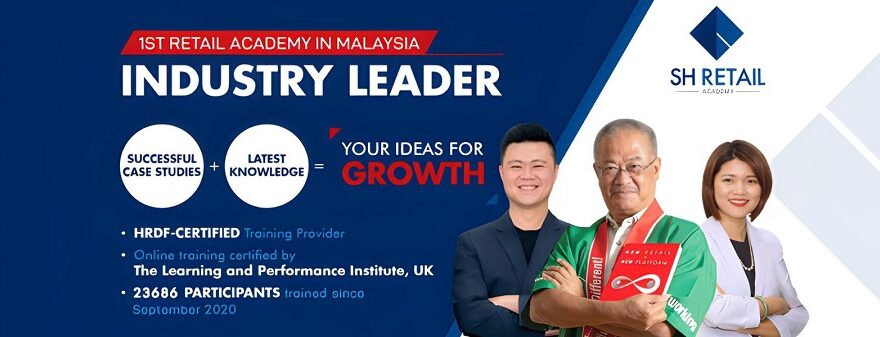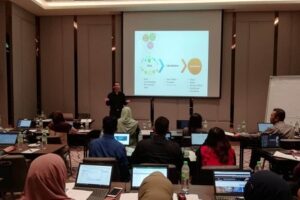
Retail plays a huge role in Malaysia’s economy. With shopping malls, online platforms, and small businesses thriving, skilled managers are more important than ever. Whether you’re entering the field or looking to sharpen your skills, choosing the right retail management course in Malaysia shapes your career path.
Retail is no longer just about selling. Today, it involves supply chains, customer experience, team leadership, and digital tools. Malaysia’s learning centres now offer courses that reflect these new challenges. Some even qualify under the HRDF training provider framework, which supports upskilling for working adults.
So, how do you choose the course that suits your needs? This guide walks you through key details to consider before enrolling. You’ll also learn how retail management fits into Malaysia’s growing industries.
What Does Retail Management Involve?
Retail management focuses on planning, running, and improving store operations. The goal is to make sure products reach customers in the right way, at the right time. Managers lead teams, manage stock, track performance, and respond to customer needs.
A good course will explore areas like:
- Store layout and design
- Staff hiring and supervision
- Product sourcing and pricing
- Sales forecasting
- Customer service strategies
- Inventory tracking systems
As retail grows more complex, the need for trained professionals grows too. That’s why choosing a course with a real-world focus matters.
Types of Retail Management Courses Available
In Malaysia, you’ll find different types of retail courses, depending on your career stage. Some focus on beginners. Others suit experienced staff looking to advance or shift roles.
1. Certificate Courses
- These courses cover basics like stock control and customer handling. They usually last a few weeks or months and help newcomers enter the industry.
2. Diploma Programmes
- Diplomas go deeper. Topics may include retail marketing, e-commerce, and leadership. These are ideal for supervisors aiming to grow into management.
3. Degree Courses
- For long-term careers, a retail-focused business degree gives broader knowledge. It mixes retail skills with subjects like accounting, economics, and business law.
4. Short-Term Skills Training
- These programmes support working professionals. Many qualify under the HRDF training provider scheme, which helps cover training costs through employer funds.
Key Topics to Look For in a Retail Management Course
Retail is fast-paced. Look for programmes that teach skills for today’s environment. A strong course should include:
1. Customer Experience
- Understanding how shoppers think improves sales and loyalty. Courses should show how to improve service, layout, and promotions.
2. Retail Analytics
- Modern managers rely on data. Learn how to track trends, forecast demand, and adjust to market changes using tools and dashboards.
3. Merchandise Planning
- Choose what to sell, when to restock, and how to display products in ways that attract attention.
4. Digital Platforms
- E-commerce is vital now. A good course should explore online selling, mobile apps, and digital payments.
5. Team Management
- Retail success depends on staff. Learn how to hire, train, and motivate your team.
How HRDF Training Providers Add Value?
The Human Resource Development Fund (HRDF) supports staff training in Malaysia. If your course is facilitated by a certified HRDF training provider, you might be eligible for financial assistance through your employer.
Here’s what that means:
- Employers can claim costs back after sending staff for training.
- Employees gain access to updated skills without large personal expenses.
- Courses meet strict quality checks, ensuring useful and up-to-date content.
Many retail employers already use HRDF support to send staff for leadership or operations courses. Check with your HR department to explore your options.
Comparing Course Options: What Matters Most
With many courses available, how do you know which fits your goals? Consider the following:
| Factor | What to Consider |
| Course Content | Does it cover modern tools and retail trends? |
| Learning Format | Online, in-person, or hybrid? Which suits you? |
| Duration | Can you commit full-time or prefer short-term? |
| Entry Requirements | Do you meet the qualifications? |
| Certification | Does it lead to a diploma, degree, or licence? |
| HRDF Eligibility | Is the provider an approved HRDF trainer? |
A quick talk with the course advisor often helps clear doubts. Ask about course outcomes and how many students move into retail roles after completion.

Benefits of Studying Retail Management in Malaysia
Retail careers offer more than meets the eye. With the right training, you’ll gain skills useful across industries. Here are some clear benefits of studying retail in Malaysia:
1. Local Market Knowledge
- Courses here explore cultural trends, buying habits, and local logistics, giving you tools to succeed in Malaysia’s diverse marketplace.
2. Industry Connections
- Training providers often work with retailers, offering chances for internships or job placements after the course.
3. Flexible Options
- Malaysia offers full-time, part-time, and online formats to suit students, workers, and career changers.
4. Skill Recognition
- Many programmes follow national skills standards, which makes your certification widely accepted by employers.
Who Should Consider a Retail Management Course?
Retail suits a wide mix of people. You might be:
- A school-leaver seeking a first job
- A shop assistant looking to move up
- A supervisor who wants formal training
- A business owner improving staff skills
- A mid-career worker switching paths
Whatever your background, a course helps you grow. With focused learning and guidance, you’ll become more confident and effective at work.
What Makes a Great Training Experience?
Courses may share titles, but the experience varies. Great learning feels practical, relevant, and challenging.
Look for courses that offer:
- Real retail case studies
- Group projects
- Presentations and role-play
- Site visits to stores or supply centres
- Assessment through tasks, not only exams
These activities turn knowledge into real-world action. They also make learning engaging and memorable.
Challenges in Choosing the Right Course
Sometimes, people feel unsure about their choice. Common barriers include:
1. Unclear Goals
- Not knowing your career direction can make it hard to choose. Speak with a counsellor or mentor to explore your interests.
2. Time Constraints
- Busy schedules limit how much time you can study. Short online modules may help you build skills in stages.
3. Cost Concerns
- While many worry about fees, an HRDF training provider may help ease the burden through employer claims.
4. Fear of Change
- Starting something new feels scary. But every skill you learn adds to your options, even if you later change course.
Why Retail Skills Stay Useful in the Future?
Retail adapts fast. Today’s manager might run a shop, tomorrow a web store. Still, the core skills stay useful across roles.
You learn how to:
- Lead teams
- Solve problems
- Plan for demand
- Communicate clearly
- Adapt to new tools
These skills apply far beyond retail — from hospitality to logistics to online services. That’s why investing in a retail management course in Malaysia creates lasting value.
Conclusion: The First Step Begins with Choice
Choosing a course is more than picking from a list. It’s the first step in shaping your career. Whether you want to grow in your current job or enter a new industry, strong training makes the path smoother.
Malaysia offers options that blend theory, practice, and modern retail tools. Many courses are run by experienced educators, and if linked to an HRDF training provider, they open doors to supported learning.
Take time to think about what you need. Explore what’s available. Then make the choice that feels right, not just for today, but for where you want to go next.
Read Also:- https://www.aniarticles.com/49820-unlock-career-opportunities-through-professional-retail-development




